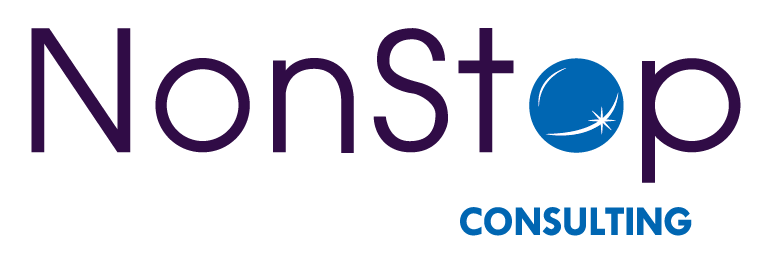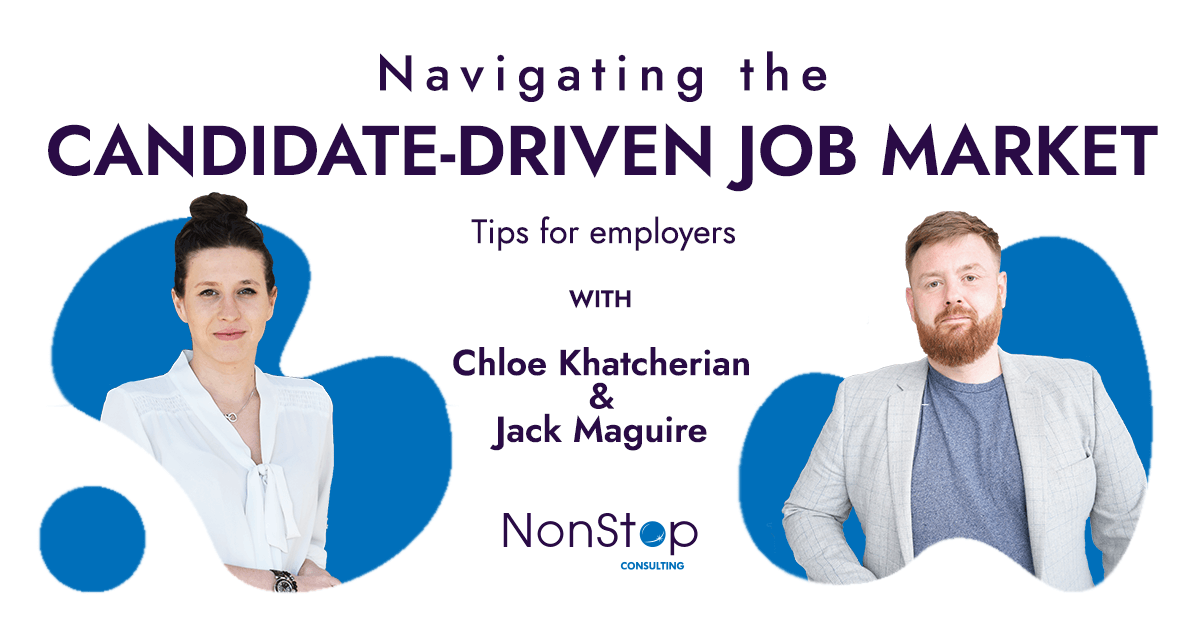It’s no secret the job market has evolved to favour job seekers in recent years and attracting and retaining top talent has become increasingly challenging for employers.
There are several reasons behind this, including low unemployment in many areas; a skills gap brought about by technological advancement and regulatory changes; increased mobility with remote work opportunities; shifting job seeker priorities and expectations; information transparency from platforms such as Glassdoor and social media, and more.
But even while the market is candidate-driven, there are things employers can do to stand out and attract the talent they need.
In this article, NonStop Director Chloe Khatcherian and Business Unit Manager Jack Maguire, who have a combined total of nearly 15 years of recruitment experience, share valuable insights and tips to help employers navigate this competitive environment.
Chloe, who recruited primarily in the French life sciences industry before moving to a more strategic role, said while some positions have always been more difficult to recruit for, the widespread need for good qualified candidates has become a real struggle across most industries. “Qualified candidates are in high demand, and they have more options and bargaining power than ever before. This is why it’s imperative employers adapt their strategies to stand out and attract top talent,” she said.
Jack, who recruits in the US chemical industry, emphasised the need for employers to rethink their approach. “Gone are the days when employers held all the cards,” he explained. “Now, it’s crucial to create a compelling employer brand, enhance the candidate experience, and offer competitive compensation and benefits packages.”
Employer branding
When it comes to employer branding, Chloe said, making sure it is as compelling as your customer facing brand is crucial to standing out.
“In a candidate-driven market, your employer brand is your competitive advantage,” she said.
“Candidates are seeking organisations that align with their values and offer a positive work culture. Employers should showcase their unique attributes, such as a commitment to diversity, work-life balance, and career development opportunities.”
Defining your employer brand starts with those points that make your company stand out as an employer, the employer value proposition, but it’s not necessarily something that can be developed overnight.
According to Jack, the best way to create an authentic employer brand is to start with research, both internally within your company, and externally. “This could start with surveying current employees to understand their perceptions of the company culture, work environment, and overall employee experience. Additionally, conduct external research to learn how your organisation is perceived by potential candidates. This could include analysing online reviews and conducting surveys,” he said.
Once defined, it’s important to make sure the messaging around it is consistent, Chloe said.
“If everyone is giving a different message, no matter how true the brand is, it won’t seem authentic. That’s why it’s important to make sure the message is clear and consistent across all channels and anyone involved in hiring processes understands how to talk about it.”
It’s also important to monitor, measure, and evaluate the effectiveness of branding efforts while remaining agile enough to adapt to emerging market trends or address any gaps, she added.
Candidate experience
According to Jack, a great employer brand is especially helpful to attract candidates at the top of the funnel, but if you can’t offer a great candidate experience once they have applied for one of your roles, you risk losing them.
“The application process should be streamlined, mobile-friendly, and transparent,” he said.
“Employers should provide prompt feedback and communication throughout the hiring process to keep candidates engaged and interested. Additionally, personalising the candidate experience can make a significant impact.”
He added he had witnessed or heard of many recruitment processes where companies lost great candidates simply because they took too long to make decisions about whether they wanted to move ahead with interviews, or they couldn’t schedule interviews for quite some time.
“Great candidates, especially in industries where they are in short supply don’t stay on the market long; it’s usually the early bird that gets the worm, therefore we always advise clients to move quickly when it comes to selecting, interviewing, and providing feedback on candidates.”
According to Chloe, keeping the process as simple as possible is also key to ensuring a great candidate experience.
“This includes clear, transparent communication; cutting back on any unnecessary interviews; adapting to online interviews if practical especially for out-of-town candidates; and making sure skill assessments are as efficient as possible.”
Competitive compensation and benefits
Chloe also highlighted the significance of offering competitive compensation and benefits. “Salary is a key factor for candidates, but it’s not the only one,” she noted. “Employers should ensure their compensation packages are attractive, considering factors such as market rates, industry standards, and geographical location.”
When it comes to figuring out what makes your offering competitive in the current market place, research is key, including looking at competitor job ads, or liaising with a professional recruitment consultancy can also help provide up-to-date market intelligence, she added.
As Chloe mentioned above, salary is not the only factor candidates are looking for, which should come as good news for smaller companies especially as they aren’t as likely to be able to offer higher salaries to outbid their competitors.
Other things candidates are looking for in their next role include flexible working arrangements, professional development, interesting projects, team environment and atmosphere, and more.
In conclusion, as the job market becomes increasingly candidate-driven, employers must adapt their strategies to attract and retain top talent. Focusing on things such as a strong employer brand, an engaging candidate experience, competitive compensation and benefits, and fostering a positive work environment to increase retention are all ways employers can remain competitive in the race for talent.





